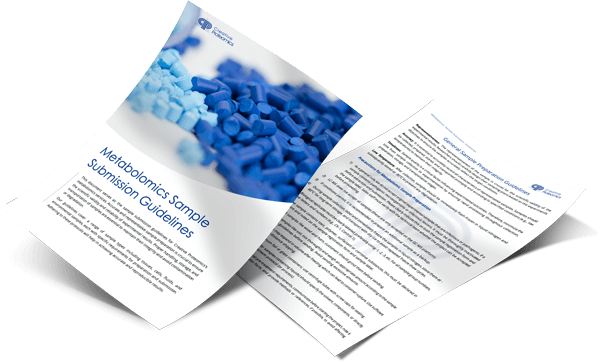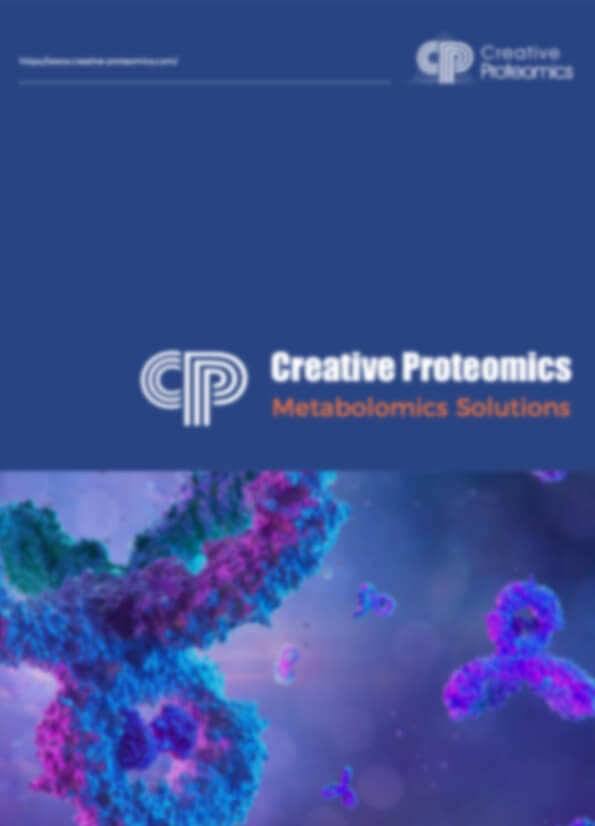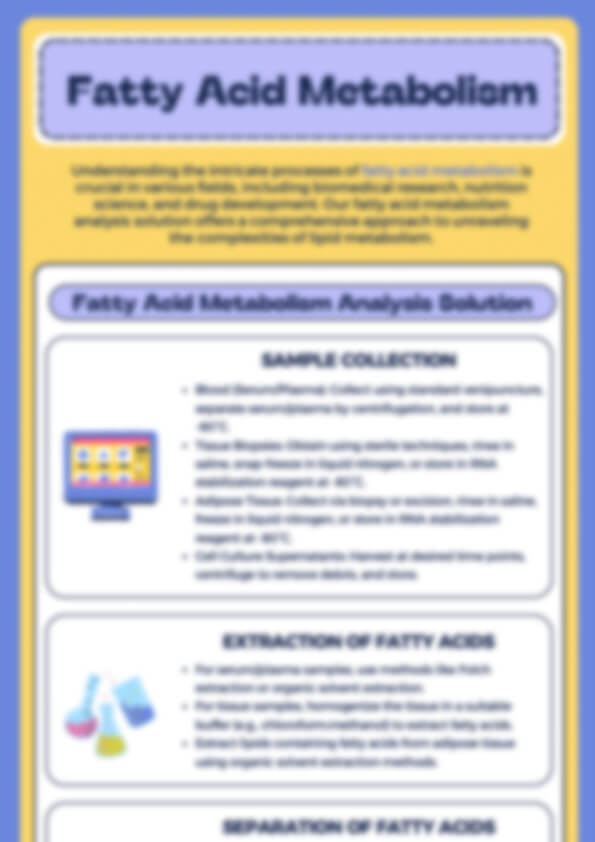- Service Details
- Demo
- Case Study
- FAQ
- Publications
What are Short Chain Fatty Acids?
Short Chain Fatty Acids (SCFAs) are a group of saturated fatty acids characterized by having aliphatic tails of two to five carbon atoms. The most abundant SCFAs produced in the human gut include acetate (C2:0), propionate (C3:0), and butyrate (C4:0), though other SCFAs such as isobutyric acid, valeric acid, and isovaleric acid are also present in smaller amounts. SCFAs are the primary by-products of the fermentation of dietary fibers by anaerobic bacteria residing in the large intestine and colon. Since humans lack the enzymes necessary to break down most dietary fibers, these fibers pass through the upper gastrointestinal tract undigested and are instead metabolized by gut bacteria.
SCFAs play a pivotal role in gut health and overall metabolic processes. They serve as a vital energy source for colonocytes, the cells lining the colon, and help maintain the integrity of the intestinal barrier. In addition to their local effects in the gut, SCFAs are absorbed into the bloodstream and have systemic effects on metabolism, immunity, and inflammation. Acetate, for example, can travel to the liver where it participates in lipid metabolism, while propionate is known to influence gluconeogenesis and cholesterol synthesis. Butyrate, perhaps the most extensively studied SCFA, is crucial for maintaining colonocyte health and exhibits strong anti-inflammatory and anti-carcinogenic properties.
Beyond their direct physiological roles, SCFAs are central to the intricate balance between the gut microbiome and host metabolism. Alterations in SCFA production have been linked to a variety of health conditions, including obesity, insulin resistance, inflammatory bowel disease (IBD), and colorectal cancer. Increasing evidence suggests that SCFAs may contribute to the regulation of appetite, energy expenditure, and immune responses, underscoring their importance in both maintaining homeostasis and preventing disease.
Short Chain Fatty Acids Analysis in Creative Proteomics
At Creative Proteomics, we offer targeted metabolomics, providing you with a wide range of short-chain fatty acid analysis services to meet the needs of researchers and clinicians working in the fields of microbiology, nutrition, gastroenterology and metabolic research. Our services are tailored to deliver high precision, reliability, and sensitivity, ensuring that our clients receive accurate and comprehensive data for their studies.
Identification and Quantification of SCFAs: We accurately identify and quantify SCFAs in various sample types, including feces, plasma, and tissue, providing essential data on SCFAs concentrations and their proportions for understanding gut microbiota activity and metabolic effects.
Customized SCFA Profiling: We design SCFA profiling to align with specific research goals, whether you're studying the effects of diet on SCFAs production or investigating the gut microbiome's impact on metabolic health.
Dietary Fiber Fermentation Studies: Our service helps researchers understand how different dietary fibers influence SCFAs production, aiding studies on gut health and metabolic function.
Gut Microbiota-SCFA Interaction Analysis: We analyze the relationship between gut microbiota changes and SCFAs production, offering insights into how microbial composition affects metabolism and health outcomes.
SCFAs in Metabolic Disease Research: Our analysis supports research into the role of SCFAs in conditions like obesity, diabetes, and cardiovascular disease, providing valuable data for developing therapeutic interventions.
List of Short Chain Fatty Acids Metabolites We Can Analyze
| Short Chain Fatty Acids Metabolites Quantified in This Service | ||||
|---|---|---|---|---|
| Acetic acid | Propionic acid | Butyric acid | Isobutyric acid | Valeric acid |
| lsovaleric acid | Caproic acid | |||
Technology Platforms Used for Short Chain Fatty Acids Analysis
At Creative Proteomics, we rely on Gas Chromatography-Mass Spectrometry (GC-MS) for precise and sensitive analysis of SCFAs. GC-MS is ideal for separating, identifying, and quantifying SCFAs in various biological samples such as plasma, feces, and tissues.
We use the Agilent 7890B GC paired with the Agilent 5977A Mass Selective Detector, known for its accuracy in SCFA profiling. The system's high-resolution Agilent J&W DB-FFAP column ensures efficient separation of SCFAs, providing reliable identification and quantification.
Our streamlined workflow includes automated sample handling via the Agilent 7693A autosampler, which supports high-throughput processing with consistent precision. Data is managed with Agilent MassHunter software, enabling precise quantification down to micromolar levels.
By employing advanced GC-MS technology, Creative Proteomics ensures accurate, reproducible SCFA analysis, making it an essential tool for researchers studying the metabolic and health impacts of SCFAs.
Sample Requirements for Short Chain Fatty Acids Analysis
| Sample Type | Normal Volume | Minimal Volume |
|---|---|---|
| Plasma (Human) | 100 µL | 50 µL |
| Serum (Human) | 100 µL | 50 µL |
| Tissue (Human) | 50 mg | 30 mg |
| Feces (Human) | 50 mg | 40 mg |
| Feces (Rodent) | 20 mg | 20 mg |
| Intestinal Contents | 50 mg | 30 mg |
| Urine | 500 µL | 200 µL |
| Cell Culture Supernatant | 1 mL | 500 µL |
Report
- A detailed technical report will be provided at the end of the whole project, including the experiment procedure, GC-MS instrument parameters
- Analytes are reported as uM or ug/mg (tissue), and CV's are generally<10%
- The name of the analytes, abbreviation, formula, molecular weight and CAS# would also be included in the report.

PCA chart

PLS-DA point cloud diagram

Plot of multiplicative change volcanoes

Metabolite variation box plot

Pearson correlation heat map
B cell-intrinsic epigenetic modulation of antibody responses by dietary fiber-derived short-chain fatty acids.
Journal: Nature communications
Published: 2020
Background
Short-chain fatty acids (SCFAs) like butyrate and propionate are produced by gut microbiota through the fermentation of dietary fibers. These metabolites play a key role in modulating immune responses, particularly in B cells, by inhibiting histone deacetylases (HDACs). This inhibition enhances histone acetylation, altering gene expression and reducing class-switch recombination (CSR), somatic hypermutation (SHM), and plasma cell differentiation.
SCFAs directly suppress the expression of key B cell genes like Aicda and Prdm1 through the upregulation of miRNAs, without relying on their role as energy substrates or GPCR signaling. Their immune-modulatory effects extend to mitigating autoimmune diseases, such as lupus, by reducing autoantibody production. SCFAs' concentration and impact are influenced by dietary fiber intake and gut microbiota composition, positioning them as potential therapeutic agents for immune regulation and autoimmune disorders.
Materials & Methods
Sample Collection and RNA Preparation
- Cell Samples: RNA was extracted from 0.2–5.0 × 10^6 cells using Trizol® Reagent or RNeasy Plus Mini Kit. For SHM analysis, spleen B cells from NP16-CGG-injected C57BL/6 mice were used. For lipidomics, cells or tissues were collected and flash-frozen.
- RNA Extraction and cDNA Synthesis: RNA was purified using gDNA eliminator columns and cDNA was synthesized with SuperScript™ III and oligo-dT primers. For miRNA, reverse transcription was performed with miScript II RT Kit.
Quantitative RT-PCR
qRT-PCR was conducted using SYBR Green and a Bio-Rad MyiQ™ Real-Time PCR System. The protocol included initial denaturation at 95°C for 15 s, followed by 40 cycles at 94°C, 60°C, and 72°C. The ΔΔCt method was used for analysis.
SHM Analysis
V186.2DJH-Cγ1, Cγ2b, or Cγ3 cDNA was amplified and sequenced using Illumina MiSeq. Somatic mutations were analyzed with IMGT/HighV-QUEST.
ChIP-qPCR
B cells were cross-linked and chromatin was sonicated. ChIP was performed with anti-acetylhistone H3 antibodies, followed by qPCR of target gene regions.
mRNA-Seq and miRNA-Seq
RNA was extracted, and sequencing libraries were prepared using Illumina TruSeq kits. Sequencing was performed on an Illumina HiSeq 3000. Data were aligned and processed using TopHat2 and HTSeq-count.
Lipids were extracted using a modified Bligh and Dyer method and analyzed by LC-MS or MALDI-TOF. Data were processed using lipidomics software.
Luciferase Reporter Assay
Aicda and Prdm1 3′UTRs were cloned into pMIR-REPORT vectors. Mutants with altered miRNA target sites were generated. Reporter activity was measured using the Luc-Pair™ Duo-Luciferase HS Assay Kit and normalized to Renilla luciferase.
Statistical Analysis
Statistical tests (Student's t-tests, χ2 tests) were performed using Excel or GraphPad Prism®. A p-value of < 0.05 was considered significant.
Data Availability
mRNA-seq and miRNA-seq data are available in NCBI GEO (GSE140111), and VDJ-seq and 16S rRNA data in NCBI SRA (BioProject PRJNA588067). Source data and additional materials are available upon request.
Results
Impact of SCFAs on Antibody Responses:
Dietary fiber-derived SCFAs (butyrate and propionate) significantly reduce both local (intestinal) and systemic antibody responses in mice. SCFAs decrease levels of IgG1, IgA, and IgE, and also reduce the number of antibody-forming cells (AFCs) and class-switched B cells.
Effects of Fiber and SCFAs:
Mice on a high-fiber diet had higher levels of butyrate and propionate, leading to lower antibody responses. When SCFAs were administered to mice on a no-fiber diet, antibody levels dropped to those seen in fiber-fed mice.
Mechanism of Action:
SCFAs inhibit antibody production through histone deacetylase (HDAC) inhibition rather than G-protein-coupled receptor (GPR) signaling. This action leads to decreased expression of Aicda and Blimp1, key regulators of antibody class switching and somatic hypermutation (SHM).
In Vitro and In Vivo Observations:
In vitro studies showed that SCFAs directly inhibit class switching and plasma cell differentiation in B cells by affecting HDAC activity. This effect was confirmed in vivo, including in T cell-deficient mice, indicating a B cell-intrinsic mechanism.
Effects on Autoimmunity:
SCFAs also reduced autoantibody levels and autoimmunity in lupus-prone mice, highlighting their potential therapeutic benefit for autoimmune conditions.
 Dietary fibers and SCFAs alter AID and Blimp1 expression, bacteria-bound/binding antibody responses, and gut bacteria composition
Dietary fibers and SCFAs alter AID and Blimp1 expression, bacteria-bound/binding antibody responses, and gut bacteria composition
 Dose-dependent and B-cell-intrinsic modulation of Aicda and Prdm1 expression, CSR, SHM and plasma cell differentiation by SCFAs in vivo.
Dose-dependent and B-cell-intrinsic modulation of Aicda and Prdm1 expression, CSR, SHM and plasma cell differentiation by SCFAs in vivo.
Reference
- Sanchez, Helia N., et al. "B cell-intrinsic epigenetic modulation of antibody responses by dietary fiber-derived short-chain fatty acids." Nature communications 11.1 (2020): 60.
How is SCFA analysis performed?
SCFA analysis is typically performed using Gas Chromatography (GC) coupled with Mass Spectrometry (MS) or Flame Ionization Detection (FID). This process involves extracting SCFAs from biological samples, such as feces, blood, or cell cultures, and then separating and quantifying them using specialized chromatographic techniques.
What types of samples can be analyzed for SCFAs?
Our SCFA analysis service can handle various types of samples, including fecal samples, blood plasma, serum, urine, and cell culture supernatants. Please ensure that samples are properly collected and preserved according to our guidelines for accurate results.
What is the turnaround time for SCFA analysis?
The standard turnaround time for SCFA analysis is typically 2-4 weeks from the receipt of samples. This timeline may vary depending on the complexity of the analysis and the volume of samples.
How do I interpret the results of SCFA analysis?
Results are usually presented as concentrations of individual SCFAs in your samples. Interpretation can involve assessing the relative abundance of different SCFAs and their potential implications for health or experimental conditions. Our experts can provide a detailed report and help interpret the data based on your specific research or clinical context.
Can SCFA analysis be customized for specific research needs?
Yes, we offer customized SCFA analysis services to meet specific research requirements. Please contact us to discuss your specific needs, including the types of SCFAs you are interested in and the sample types you are working with.
Are there any specific storage or shipping requirements for SCFA samples?
Yes, proper storage and shipping are crucial for maintaining sample integrity. Fecal samples should be kept frozen, blood samples should be kept on ice and processed promptly, and urine samples should be refrigerated or frozen. Follow our sample handling guidelines to ensure accurate results.
Can you analyze SCFAs from non-human samples?
Yes, we can perform SCFA analysis on a variety of non-human samples, including those from animal models. Please provide detailed information about your samples and any specific requirements you may have.
B cell-intrinsic epigenetic modulation of antibody responses by dietary fiber-derived short-chain fatty acids.
Sanchez, Helia N., Joshua Moroney, Lei Gan, Sarah K. Zuniga, Cameron O. Miller, Jean Y. Kuroda, Ronald S. Schwartz, and Mark J. Shlomchik.
Journal: Nature Communications
Year: 2020
https://doi.org/10.1038/s41467-019-13603-6
Exogenous lipase administration alters gut microbiota composition and ameliorates Alzheimer's disease-like pathology in APP/PS1 mice.
Menden, Ariane, Stephanie Conradi, Monika Gerlach, Lars Hoffmann, Kathrin Henkel, Aida Mikolajczyk, and Elke Richling.
Journal: Scientific Reports
Year: 2022
https://doi.org/10.1038/s41598-022-08840-7
Clinical trial of a probiotic and herbal supplement for lung health.
Wenger, Nancy M., Nicole R. Lucas, Carlos B. Marcelo, Alexander S. Martinez, and Rachel L. Stout.
Journal: Frontiers in Nutrition
Year: 2023
https://doi.org/10.3389/fnut.2023.1168582








